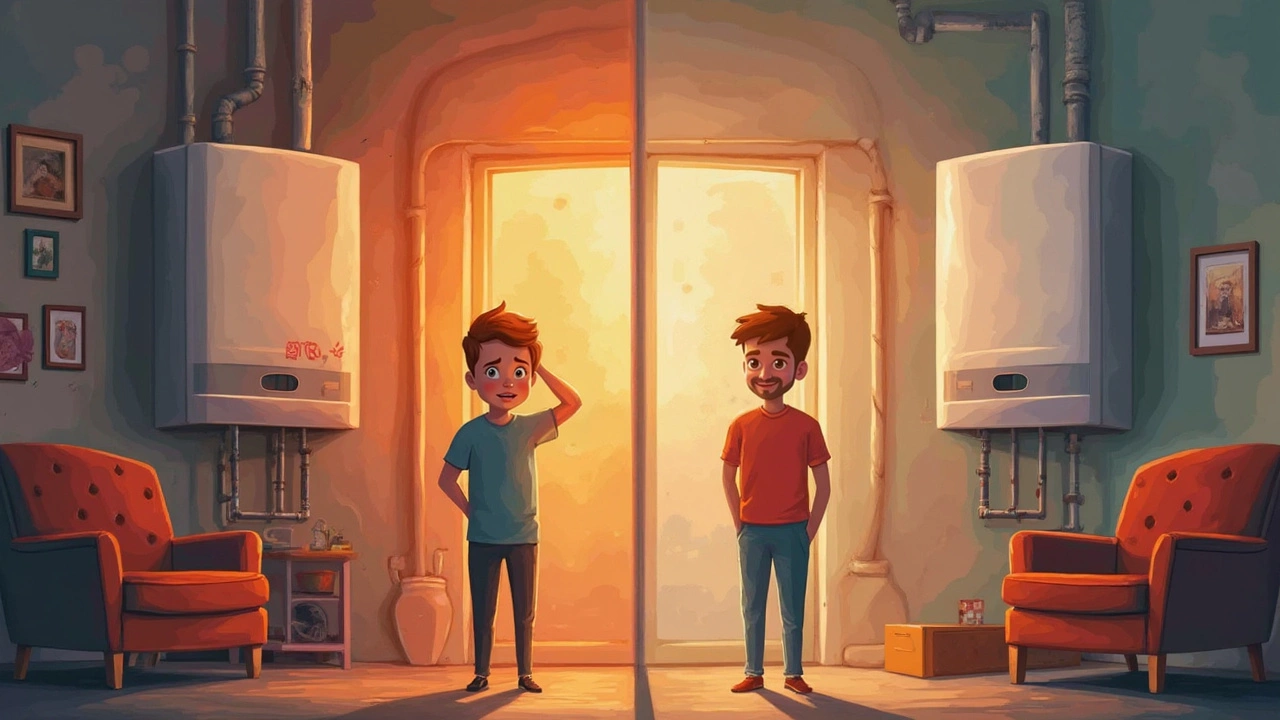Got a boiler at home and wondering if it's got a few good years left, or if it's just living on borrowed time? You're not alone. Nobody wants to drop cash on a new one if they can squeeze a few more winters out of the old faithful. But ignoring a dying boiler can lead to freezing nights, sky-high bills, or even leaks and water damage. Not fun.
Picture this: My own boiler nearly quit on me in January last year, just as I was headed out to walk my dog Charlie. Five minutes before heading out, zero heat and a noise like Luna—the cat, not the moon—was trapped inside. So, yeah, these things fail when you least expect it.
If you don't want surprises, you need to know what actually kills a boiler and what you can do to keep it running longer. Smart moves now can save you heaps of cash and drama later. Plus, keeping an eye on a few specific clues can help you decide if a call to the repair guy is enough, or if it’s time to wave goodbye.
- What Affects Your Boiler’s Lifespan?
- Typical Life Expectancy of Modern Boilers
- Telltale Signs Yours is Wearing Out
- How to Squeeze More Years Out of Your Boiler
- When It’s Time to Repair vs Replace
What Affects Your Boiler’s Lifespan?
Let’s be honest: Your boiler isn’t just going to bow out because it’s old. There’s a whole stack of reasons some last twenty years and others are toast after eight. Here’s what really matters when it comes to boiler longevity.
- Boiler maintenance is the deal breaker. Regular checkups—think once a year—spot issues before they turn ugly. Skipping this? You’re basically gambling with your boiler.
- The quality of installation matters more than most think. A bad setup can lead to leaks, pressure issues, and crazy noises. Always go with a certified installer. Cheap jobs cost more later.
- Hard water can seriously mess things up. Over time, minerals from hard water build up inside the boiler, causing blockages and making it work harder. If you’re living somewhere with hard water, fitting a water softener can buy your boiler extra years.
- The type and brand make a difference, too. Not all boilers are created equal. Some brands are famous for hitting 20+ years, while budget options may start grumbling sooner.
- How much you use it counts. A boiler that works overtime in a big family home is going to wear out faster than one in a tiny apartment, simple as that.
Take a look at how different factors can change your average boiler’s life:
| Factor | Impact on Lifespan (Years) | Tip |
|---|---|---|
| Annual servicing (good maintenance) | +5 to 7 | Book a yearly checkup |
| Poor installation | -3 to -5 | Use trusted installers |
| Hard water (untreated) | -2 to -4 | Add a softener |
| High quality/model | +5 | Choose a solid brand |
One tiny leak or bit of sludge left alone for too long, and suddenly your trusty boiler is burning out years early. Want it to last? Stay on top of these things. It really can be that straightforward.
Typical Life Expectancy of Modern Boilers
If you're asking how long a boiler will really last, here’s the honest scoop: most modern boilers give you around 10 to 15 years of solid service. Some brands claim theirs can push 20, but that usually takes perfect conditions—think great water quality, yearly servicing, and no skipping on repairs. If you’re in a city with hard water or your maintenance isn’t spot on, expect the lifespan to be on the shorter side.
Gas boilers and combi boilers make up the bulk of what people have now. The differences in lifespan between types aren’t huge, but here’s a quick comparison so you know what’s what:
| Boiler Type | Average Lifespan (Years) |
|---|---|
| Combi boiler | 10-15 |
| System boiler | 10-15 |
| Conventional boiler | 12-15 |
It isn’t just age that matters, though. The big boiler lifespan killer is neglect. Skipping out on checks and letting small faults slide will cut years off fast. A study out of the UK found that boilers with regular annual servicing had 30% fewer breakdowns and lasted on average 3 years longer. Simple checks really do make a difference.
Another real-world factor: location. If your boiler is wedged under a dusty, cluttered stair cupboard or jammed in a cold garage, it might not last as long as one installed with good airflow and easy access for repairs. Don’t blame the manufacturer if yours starts croaking after 8 years in a swampy basement.
Quick reminder—these numbers aren’t a guarantee, just a helpful guide so you can plan (and save) instead of scrambling when the heat cuts out in the middle of December.

Telltale Signs Yours is Wearing Out
You won’t always hear a boiler beg for retirement. Sometimes it’s a slow fade: odd sounds, less heat, or your energy bills jumping for no good reason. Most boilers give off warning signs before fully giving up, but they can be easy to brush off—until you’re dealing with no hot water in the middle of a cold snap.
Here are some clear signs you should watch for. If you spot a couple at once, time to act fast:
- Boiler lifespan of 12-15 years or more—modern gas boilers tend to start struggling after this point, especially if servicing has been patchy.
- Clanking, banging, or gurgling noises—these aren’t just annoying, they often mean parts inside are failing, or there’s a buildup of limescale.
- Uneven heating—the radiators take forever to heat or stay cold in spots.
- Leaks or puddles surrounding the unit—water anywhere near your boiler is bad news, and can damage floors or walls fast.
- Pilot light that keeps going out—if you’re relighting the flame more than your last birthday cake, call a pro.
- Rising energy bills—if usage hasn’t changed but the cost is creeping up, your boiler could be losing efficiency.
Take a look at this quick breakdown. Research published by the Energy Saving Trust says most boilers lose about 10% efficiency each decade they run. Meaning, if yours is pushing 15 years old, it could be working a lot harder just to get the same results.
| Boiler Age | Average Efficiency (%) | Typical Repair Risk |
|---|---|---|
| 0-5 years | 92-98 | Low |
| 6-10 years | 85-90 | Medium |
| 11-15 years | 75-85 | High |
| 16+ years | Below 75 | Very High |
If your boiler’s showing more than one of these symptoms, it’s usually smarter (and cheaper) to address it early—before it really gives up and leaves you in the cold. Don’t just crank the thermostat and hope for the best. Your wallet and comfort will thank you.
How to Squeeze More Years Out of Your Boiler
If you want to get every last bit of life out of your boiler, you’ve got to treat it right. Most boilers can last between 10 and 15 years, but I've seen a few hang on for 20 with good care. Taking care of the basics can mean fewer repairs, fewer cold mornings, and more money in your pocket.
The first thing is simple—schedule annual servicing. A pro can spot leaks, dodge carbon monoxide risks, and clear out sludge before it leads to expensive headaches. According to UK Gas Safe data, boilers that get a yearly service are 40% less likely to break down suddenly.
Next, don’t ignore weird noises or small leaks. If you hear clanking, banging, or see puddles under the boiler, don’t just hope it goes away. Early fixes are usually cheap, but if you wait, you’ll end up spending way more.
Bleed your radiators at least once a year. Air bubbles stop hot water from moving around right, which means your boiler has to work harder. Harder work equals shorter life—simple math.
Another trick: keep the pressure gauges in the right zone. Dropping too low or spiking too high puts major stress on the whole system and could cause a breakdown.
We all like a warm house, but cranking the thermostat up super high all winter makes your boiler age faster. Try dropping it a couple of degrees. Less stress, longer life—that’s proven.
- Get a pro in for yearly maintenance.
- Fix leaks and noises quickly.
- Bleed your radiators once a year.
- Check your pressure gauge monthly.
- Avoid high thermostat settings nonstop.
Water quality matters too. If you live in a hard water area, minerals build up and clog the system. A magnetic filter or regular power flushing helps stop this problem before it wrecks your boiler.
Here’s a quick data check so you can see what helps the most:
| Care Step | Average Extra Years Added | Breakdown Risk Reduced By |
|---|---|---|
| Annual Professional Service | +2 years | 40% |
| Regular Bleeding Radiators | +1 year | 20% |
| Pressure Checks & Adjustments | +1.5 years | 25% |
| Prompt Leak Repairs | +1 year | 15% |
If you focus on the basics and stay on top of boiler maintenance, you’ll avoid most of the major headaches—and maybe keep your boiler around for longer than you thought possible. Your bank account (and maybe Charlie and Luna) will thank you.

When It’s Time to Repair vs Replace
It can be tough to know if you should fix a broken boiler or bite the bullet and get a new one. Cost isn’t the only thing you need to think about. Even if a repair seems cheaper right now, it might not save you money in the long run, especially if your system is close to the end of its boiler lifespan.
First, look at the age. If your boiler is past 15 years, repairs start to be a losing game. Modern boilers usually last 10-15 years if you’ve kept up with maintenance. If yours is pushing or past that mark—and you’ve already fixed major parts—replacement starts making more sense.
Here are the signs your boiler is ready for retirement:
- It breaks down often (not just once a year during the coldest day).
- Your energy bills keep going up, even though your habits haven’t changed.
- You see rust, leaks, or cracks in the main body.
- You’re spending more money on patching it up than you would for a chunk of a new system.
- It’s getting harder to find replacement parts (yeah, older models can be a pain for this).
If you’re only dealing with minor issues, like a faulty thermostat, weird noises, or a simple valve swap, repair can still be a good bet. But if a technician says the heat exchanger is shot—one of the most expensive parts—think twice about fixing it. That’s like putting new tires on a car with a blown engine.
Let’s put numbers to it so you can really compare. Check out the table below for the costs you’re looking at:
| Boiler Age | Average Repair Cost | Average Replacement Cost |
|---|---|---|
| Under 5 years | $150 - $400 | $3500 - $6000 |
| 5-10 years | $200 - $600 | $3500 - $6000 |
| 10-15 years | $400 - $1200 | $3500 - $6000 |
| 15+ years | $600 - $1500 (if parts even available) | $3500 - $6000 |
Don’t forget to factor in other stuff: Is your current boiler efficient? A swap might save you 20-30% on heating bills, which adds up fast. And modern units tend to be way quieter and safer. If all your repairs in the last year would pay for half a new boiler—especially one with a sweet warranty—then your answer is staring right at you.
So, next time your boiler makes a groan or rattles after a cold snap, ask yourself: will a fix actually keep things cozy without draining your wallet, or is it just time to move on?


